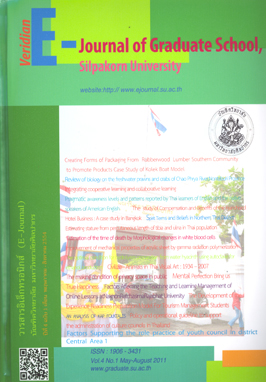ผลของการให้คำปรึกษาแนวโยนิโสมนสิการที่มีต่อการเพิ่มพูนจิตสำนึกสาธารณะของนักศึกษา มหาวิทยาลัยศิลปากร
Main Article Content
บทคัดย่อ
บทคัดย่อ
การวิจัยครั้งนี้มีวัตถุประสงค์เพื่อศึกษาผลของกลุ่มจิตวิทยาการปรึกษาแนวโยนิโสมนสิการที่มีต่อ การเพิ่มพูนจิตสำนึกสาธารณะของนักศึกษามหาวิทยาลัยศิลปากรและปรากฏการณ์ทางจิตใจเกี่ยวกับ พฤติกรรมจิตสำนึกสาธารณะของนักศึกษาที่เข้ากลุ่ม กลุ่มตัวอย่างเป็นนักศึกษามหาวิทยาลัยศิลปากร จำนวน 32 คน แบ่งเป็นกลุ่มทดลอง 2 กลุ่มและกลุ่มควบคุม 2 กลุ่ม แต่ละกลุ่มมีจำนวนนักศึกษา 8 คน ดำเนินการทดลอง 3 วันต่อเนื่องแบ่งเป็น 7 ช่วง ช่วงละ 3 ชั่วโมง รวม 21 ชั่วโมง วัดพฤติกรรมจิตสำนึก สาธารณะ 3 ครั้ง ได้แก่ ก่อนการทดลอง หลังการทดลองและระยะติดตามผล 4 สัปดาห์ เก็บรวมรวมข้อมูล ด้วยแบบวัดพฤติกรรมจิตสำนึกสาธารณะนักศึกษา แบบรายงานตนเองที่ผู้วิจัยสร้างขึ้น และการสัมภาษณ์ เชิงลึก วิเคราะห์ข้อมูลด้วยการทดสอบความแตกต่างระหว่างกลุ่ม(t-test) และการวิเคราะห์เนื้อหา
ผลการวิจัยพบว่า
1. หลังการทดลอง นักศึกษาที่เข้ากลุ่มทดลองมีคะแนนพฤติกรรมจิตสำนึกสาธารณะสูงกว่าก่อน การทดลอง อย่างมีนัยสำคัญทางสถิติที่ระดับ .05
2. หลังการทดลอง นักศึกษาที่เข้ากลุ่มทดลองมีคะแนนพฤติกรรมจิตสำนึกสาธารณะสูงกว่ากลุ่ม ควบคุมอย่างมีนัยสำคัญทางสถิติที่ระดับ .05
3. หลังการทดลองและระยะติดตามผล 4 สัปดาห์ นักศึกษาที่เข้ากลุ่มทดลองมีความคงทนของ คะแนนพฤติกรรมจิตสำนึกสาธารณะ อย่างมีนัยสำคัญที่ระดับ .05
4. การวิเคราะห์เนื้อหา พบว่า หลังการเข้ากลุ่มจิตวิทยาการปรึกษาแนวโยนิโสมนสิการ นักศึกษาเกิดการรู้คิดจากสัมพันธภาพที่ขยายความเข้าใจโลกและชีวิตตามจริง และมีพฤติกรรมจิตสำนึก สาธารณะเพิ่มขึ้นในทุกด้านได้แก่การตระหนักรู้และมีส่วนร่วมในการแก้ไขปัญหา การอยู่ร่วมกันอย่างเกื้อกูล การเคารพหน้าที่และข้อปฏิบัติทางสังคม และการอุทิศตนทำงานเพื่อประโยชน์ส่วนรวม โดยผู้นำกลุ่มเป็น ปัจจัยเริ่มต้นที่นำไปสู่การเพิ่มพูนพฤติกรรมจิตสำนึกสาธารณะและการรู้คิดของนักศึกษาที่เข้ากลุ่ม
Abstract
The purposes of this research were to study the effects of Yonisonamasikara group counselling on increasing students’ public consciousness behaviors of Silpakorn University and to investigate psychological experiences concerning public consciousness behaviors of the students who participated in the group, through quantitative and qualitative data. The quantitative data obtained through the quasi-experimental with pretest-posttest control group design. Thirty-two students from Silpakorn University were assigned into 2 experimental groups and 2 control groups each group comprised of 8 participants. The experimental groups participated in Yonisonamasikara group counseling for 7 sessions, a session of three hours, for 3 consecutive days, which made approximately 21 hours. During the pretest, posttest and 4-week follow-up study, all participants completed The Personal View Survey. The t-test were used for data analysis. The qualitative data were obtained through the semi-structure interview with 5 participants from the experimental group, after the experiment.
The results of research revealed that :
1. The posttest follow-up scores on public consciousness behaviors of the experimental group were significantly higher than that of the pretest scores (p<.05).
2. The posttest follow-up scores on public consciousness behaviors of the experimental group were significantly higher than those scores of the control group (p<.05).
3. The posttest and 4-week follow-up scores on public consciousness behaviors of the experimental group were significantly higher than that of the pretest scores (p<.05).
4. The qualitative analysis of the data indicated that the group members perceived the beneficial effects of Yonisonamasikara group counselling. The positive interactions and warm and trusting relationships in the group were experienced by the group members which contributing to their understanding, accepting, realizing the values of themselves and the others and also enabled them to realize more public consciousness behaviors. These meaningful relationships facilitating by the group leaders were the initial factors enhancing the public consciousness behaviors and intellectual among the group members.
Key Words : Public consciousness behaviors, Yonisonamasikara group counselling, Students of Silpakorn University

